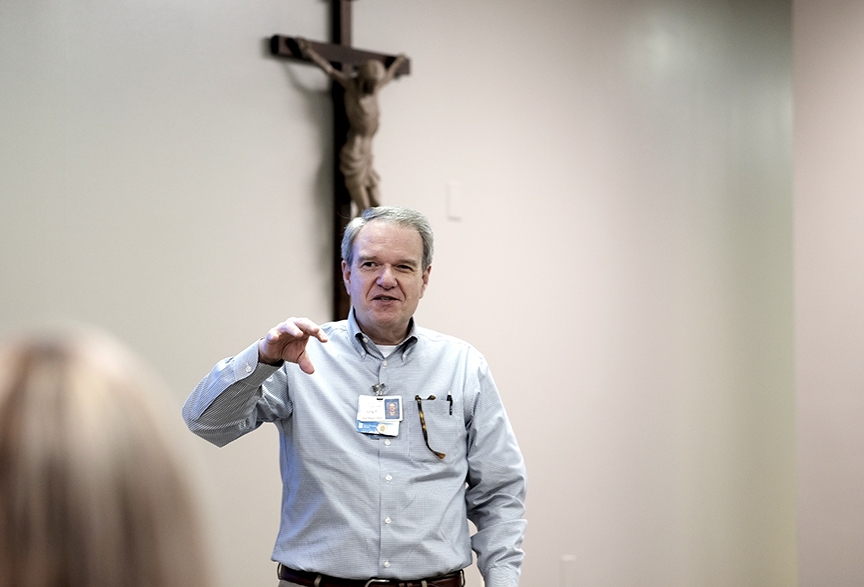
Employees come to Ascension Saint Thomas from a wide variety of faith traditions. So, it’s important to help them to understand the Catholic view of health care.
That’s the goal of Ascension Saint Thomas’ Roots of Ministry Leadership program for the Catholic health system’s managers and leaders.
The goal of the program “is to deepen participants’ appreciation for the mission and values of Ascension, and the rich legacy of our founders. It was the Daughters of Charity who came to Nashville 125 years ago to begin the ministry of Saint Thomas,” said Greg Pope, chief mission integration officer of Ascension Saint Thomas. “The Daughter’s left Nashville in 2014, entrusting the ongoing care of their ministry to the laity.
“Also covered is our relationship to the Church, providing a deeper understanding of how Catholic social teaching informs Catholic health ministry, and what we do that is different from others in the way that we provide health care,” Pope said.
The first meeting of the latest cohort of managers and leaders in the program was held Friday, Jan. 27, at the Catholic Pastoral Center.
The program originated with the Saint Thomas system about 15 years ago, Pope said. Ascension, one of the nation’s leading Catholic health systems, adopted the various local programs for use across the country.
“Ascension leaders reimagined the program in the last year,” Pope said. The participants meet monthly for six months. Each session is devoted to one or two of the principles of Catholic social teaching. “We focus a good deal on providing mutual respect and valuing the diversity and dignity of all life,” Pope said.
Ascension Saint Thomas’ employees mirror the diversity of faith traditions – as well as those with no faith tradition – found in the community, Pope said. Although many are not Catholic, “We’re helping them integrate their own experience with those of the ever true teachings of the Church,” he said. “Individuals find ways to make connections from their own faith and lived human experience.”
“Most associates easily integrate the material, making it their own, living with it in harmony, and sharing it with others,” Pope said. “They just have to be able to articulate it to promote it and to live it better.”
For one of the meetings, the group will spend the day at Room In the Inn.
“That is a very impactful day,” Pope said. It brings the participants in the program “to a place where they better understand how we can live in solidarity with those who are poor and vulnerable,” he added.
The program is designed to remind the participants of the values and history of Saint Thomas.
“While I might share the history on a weekly basis,” Pope said, the program participants “might hear it once or twice in a decade. They hear it first during orientation. They can also see it illustrated on the walls of our facilities. We make the mission visible with photographs and symbology throughout our hospitals and facilities.”
“We want to keep the tradition of the Daughters alive here in Nashville through these images and stories,” Pope said. “This history helps associates appreciate how and why we came to be.”
Maintaining Ascension Saint Thomas’ Catholic identity is an important part of the program, Pope said. “At the end of the day, all formation is about preserving and advancing our identity,” he said. “As it’s who we say we are, so it’s important that we live it out in authentic and meaningful ways.”
“People who come to us for their care ought to be able to say, ‘There’s something different about this place,’ and to experience their care as a gift that comes from our being faithful to the teachings of the Church,” added Pope, a parishioner at St. Matthew Church in Franklin.
If an organization does not work to maintain its Catholic identity, “it can be lost or watered down, becoming merely words that hang on a wall,” Pope said. “The mission can reside on our walls, the crucifix can adorn each room, but this alone isn’t enough. Unless we live it visibly, growing as individuals, we can’t minister to others in the way that we should.”
“We have found that leaders who participate in formation programs have longevity, they’re less likely to leave the organization for a secular opportunity. As participants recognize their unique gifts and come to see their work as a calling, a ministry to others, they realize how true service makes them whole, and, in turn, this strengthens our community,” Pope said.
“Also, it makes them better leaders of people,” he said. “It helps them integrate our mission with their calling in a way that is relatable and accessible to new associates.”
Ascension Saint Thomas hopes program participants can pass what they learn to the employees they supervise by their example, Pope said. “The goal is to deepen and strengthen their understanding of our mission to enhance their leadership and management of associates, whether that’s in a moment of prayer and reflection or simply better relating to and helping them through a challenge or difficulty.”









